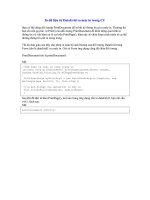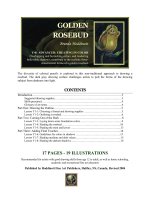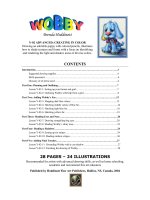Advanced metaprogramming in classic c++
Bạn đang xem bản rút gọn của tài liệu. Xem và tải ngay bản đầy đủ của tài liệu tại đây (3.21 MB, 554 trang )
www.allitebooks.com
For your convenience Apress has placed some of the front
matter material after the index. Please use the Bookmarks
and Contents at a Glance links to access them.
www.allitebooks.com
Contents at a Glance
About the Author ....................................................................................................xix
About the Technical Reviewer ................................................................................xxi
Acknowledgments ................................................................................................xxiii
Preface ..................................................................................................................xxv
■ #include
■ Chapter 1: Templates ............................................................................................. 3
■ Chapter 2: Small Object Toolkit ........................................................................... 93
■ #include <techniques>................................................................... 119
■ Chapter 3: Static Programming ......................................................................... 121
■ Chapter 4: Overload Resolution ......................................................................... 173
■ Chapter 5: Interfaces ......................................................................................... 229
■ Chapter 6: Algorithms ....................................................................................... 275
■ Chapter 7: Code Generators ............................................................................... 327
■ Chapter 8: Functors ........................................................................................... 373
■ Chapter 9: The Opaque Type Principle ............................................................... 415
■ #include <applications>................................................................. 475
■ Chapter 10: Refactoring .................................................................................... 477
■ Chapter 11: Debugging Templates ..................................................................... 501
■ Chapter 12: C++0x ............................................................................................ 515
vii
www.allitebooks.com
■ CONTENTS AT A GLANCE
■ Appendix A: Exercises ....................................................................................... 527
■ Appendix B: Bibliography .................................................................................. 533
Index ..................................................................................................................... 535
viii
www.allitebooks.com
PART 1
#include
#include <techniques>
#include <applications>
www.allitebooks.com
CHAPTER 1
Templates
“C++ supports a variety of styles.”
Bjarne Stroustrup, A Perspective on ISO C++
Programming is the process of teaching something to a computer by talking to the machine in one of its
common languages. The closer to the machine idiom you go, the less natural the words become.
Each language carries its own expressive power. For any given concept, there is a language where its
description is simpler, more concise, and more detailed. In assembler, we have to give an extremely rich
and precise description for any (possibly simple) algorithm, and this makes it very hard to read back. On
the other hand, the beauty of C++ is that, while being close enough to the machine language, the language
carries enough instruments to enrich itself.
C++ allows programmers to express the same concept with different styles and good C++ looks more natural.
First you are going to see the connection between the templates and the style, and then you will dig into
the details of the C++ template system.
Given this C++ fragment:
double x = sq(3.14);
Can you guess what sq is? It could be a macro:
#define sq(x) ((x)*(x))
A function:
double sq(double x)
{
return x*x;
}
A function template:
template <typename scalar_t>
inline scalar_t sq(const scalar_t& x)
{
return x*x;
}
3
www.allitebooks.com
CHAPTER 1 ■ TEMPLATES
A type (an unnamed instance of a class that decays to a double):
class sq
{
double s_;
public:
sq(double x)
: s_(x*x)
{}
operator double() const
{ return s_; }
};
A global object:
class sq_t
{
public:
typedef double value_type;
value_type operator()(double x) const
{
return x*x;
}
};
const sq_t sq = sq_t();
Regardless of how sq(3.14) is implemented, most humans can guess what sq(3.14) does just looking
at it. However, visual equivalence does not imply interchangeableness. If sq is a class, for example, passing a
square to a function template will trigger an unexpected argument deduction:
template <typename T> void f(T x);
f(cos(3.14)); // instantiates f<double>
f(sq(3.14)); // instantiates f<sq>. counterintuitive?
Furthermore, you would expect every possible numeric type to be squared as efficiently as possible, but
different implementations may perform differently in different situations:
std::vector<double> v;
std::transform(v.begin(), v.end(), v.begin(), sq);
If you need to transform a sequence, most compilers will get a performance boost from the last
implementation of sq (and an error if sq is a macro).
4
www.allitebooks.com
CHAPTER 1 ■ TEMPLATES
The purpose of TMP is to write code that is:
•
Visually clear to human users so that nobody needs to look underneath.
•
Efficient in most/all situations from the point of view of the compiler.
•
Self-adapting to the rest of the program.1
Self-adapting means “portable” (independent of any particular compiler) and “not imposing
constraints”. An implementation of sq that requires its argument to derive from some abstract base class
would not qualify as self-adapting.
The true power of C++ templates is style. Compare the following equivalent lines:
double x1 = (-b + sqrt(b*b-4*a*c))/(2*a);
double x2 = (-b + sqrt(sq(b)-4*a*c))/(2*a);
All template argument computations and deductions are performed at compile time, so they impose
no runtime overhead. If the function sq is properly written, line 2 is at least as efficient as line 1 and easier to
read at the same time.
Using sq is elegant:
•
It makes code readable or self-evident
•
It carries no speed penalty
•
It leaves the program open to future optimizations
In fact, after the concept of squaring has been isolated from plain multiplication, you can easily plug in
specializations:
template <typename scalar_t>
inline scalar_t sq(const scalar_t& x)
{
return x*x;
}
template <>
inline double sq(const double& x)
{
// here, use any special algorithm you have!
}
Looselyspeaking,that’sthereasonforthe“meta”prefixin“metaprogramming”.
1
5
www.allitebooks.com
CHAPTER 1 ■ TEMPLATES
1.1. C++ Templates
The classic C++ language admits two basic types of templates—function templates and class templates2:
Here is a function template:
template <typename scalar_t>
scalar_t sq(const scalar_t& x)
{
return x*x;
}
Here is a class template:
template
<
typename scalar_t,
// type parameter
bool EXTRA_PRECISION = false,
// bool parameter with default value
typename promotion_t = scalar_t // type parameter with default value
>
class sum
{
// ...
};
When you supply suitable values to all its parameters, a template generates entities during compilation.
A function template will produce functions and a class template will produce classes. The most important
ideas from the TMP viewpoint can be summarized as follows:
•
You can exploit class templates to perform computations at compile time.
•
Function templates can auto-deduce their parameters from arguments. If you
call sq(3.14), the compiler will automatically figure out that scalar_t is double,
generate the function sq<double>, and insert it at the call site.
Both kinds of template entities start declaring a parameter list in angle brackets. Parameters can include
types (declared with the keyword typename or class) and non-types: integers and pointers.3
Note that, when the parameter list is long or when you simply want to comment each parameter
separately, you may want to indent it as if it were a block of code within curly brackets.
Parameters can in fact have a default value:
sum<double> S1;
sum<double, true> S2;
// template argument is 'double', EXTRA_PRECISION is false
InmodernC++therearemore,butyoucanconsiderthemextensions;theonesdescribedherearemetaprogramming
first-classcitizens.Chapter12hasmoredetails.
3
Usuallyanyintegertypeisaccepted,includingnamed/anonymousenum,bool,typedefs(likeptrdiff_tandsize_t),
andevencompiler-specifictypes(forexample,__int64inMSVC).Pointerstomember/globalfunctionsareallowed
withnorestriction;apointertoavariable(havingexternallinkage)islegal,butitcannotbedereferencedatcompile
time,sothishasverylimiteduseinpractice.SeeChapter11.
2
6
www.allitebooks.com
CHAPTER 1 ■ TEMPLATES
A template can be seen as a metafunction that maps a tuple of parameters to a function or a class.
For example, the sq template
template <typename scalar_t>
scalar_t sq(const scalar_t& x);
maps a type T to a function:
T T (*)(const T&)
In other words, sq<double> is a function with signature double (*)(const double&). Note that double
is the value of the parameter scalar_t.
Conversely, the class template
template <typename char_t = char>
class basic_string;
maps a type T to a class:
T basic_string<T>
With classes, explicit specialization can limit the domain of the metafunction. You have a general
template and then some specializations; each of these may or may not have a body.
// the following template can be instantiated
// only on char and wchar_t
template <typename char_t = char>
class basic_string;
// note: no body
template < >
class basic_string<char>
{ ... };
template < >
class basic_string<wchar_t>
{ ... };
char_t and scalar_t are called template parameters. When basic_string<char> and sq<double> are
used, char and double are called template arguments, even if there may be some confusion between double
(the template argument of sq) and x (the argument of the function sq<double>).
When you supply template arguments (both types and non-types) to the template, seen as a
metafunction, the template is instantiated, so if necessary the compiler produces machine code for the
entity that the template produces.
Note that different arguments yield different instances, even when instances themselves are identical:
sq<double> and sq<const double> are two unrelated functions.4
4
Thelinkermayeventuallycollapsethem,astheywilllikelyproduceidenticalmachinecode,butfromalanguage
perspectivetheyaredifferent.
7
www.allitebooks.com
CHAPTER 1 ■ TEMPLATES
When using function templates, the compiler will usually figure out the parameters. We say that an
argument binds to a template parameter.
template <typename scalar_t>
scalar_t sq(const scalar_t& x) { return x*x; }
double pi = 3.14;
sq(pi);
// the compiler "binds" double to scalar_t
double x = sq(3.14);
double x = sq<double>(3.14);
// ok: the compiler deduces that scalar_t is double
// this is legal, but less than ideal
All template arguments must be compile-time constants.
•
Type parameters will accept everything known to be a type.
•
Non-type parameters work according to the most automatic
casting/promotion rule.5
Here are some typical errors:
template <int N>
class SomeClass
{
};
int main()
{
int A = rand();
SomeClass<A> s;
// error: A is not a compile time constant
const int B = rand();
SomeClass<B> s;
// error: B is not a compile time constant
static const int C = 2;
SomeClass<C> s;
// OK
}
The best syntax for a compile-time constant in classic C++ is static const [[integer type]]
name = value;.
The static prefix could be omitted if the constant is local, in the body of a function, as shown previously.
However, it’s both harmless and clear (you can find all the compile-time constants in a project by searching
for "static const" rather than "const" alone).6
Anexceptionbeingthatliteral0maynotbeavalidpointer.
SeeSections1.3.6and11.2.2formorecompletediscussions.
5
6
8
CHAPTER 1 ■ TEMPLATES
The arguments passed to the template can be the result of a (compile-time) computation. Every valid
integer operation can be evaluated on compile-time constants:
•
Division by zero causes a compiler error.
•
Function calls are forbidden.7
•
Code that produces an intermediate object of non-integer/non-pointer type is
non-portable, except when inside sizeof: (int)(N*1.2), which is illegal. Instead use
(N+N/5). static_cast<void*>(0) is fine too.8
SomeClass<(27+56*5) % 4> s1;
SomeClass<sizeof(void*)*CHAR_BIT> s1;
Division by zero will cause a compiler error only if the computation is entirely static. To see the
difference, note that this program compiles (but it won’t run).
template <int N>
struct tricky
{
int f(int i = 0)
{
return i/N;
}
};
// i/N is not a constant
int main()
{
tricky<0> t;
return t.f();
}
test.cpp(5) : warning C4723: potential divide by 0
On the other hand, compare the preceding listing with the following two, where the division by zero
happens during compilation (in two different contexts):
int f()
{
return N/N;
}
// N/N is a constant
test.cpp(5) : error C2124: divide or mod by zero
.\test.cpp(5) : while compiling class template member function
'int tricky<N>::f(void)'
with
[
N=0
]
SeethenoteinSection1.3.2.
Youcancastafloating-pointliteraltointeger,sostrictlyspeaking,(int)(1.2)isallowed.Notallcompilersare
rigorousinregardtothisrule.
7
8
9
CHAPTER 1 ■ TEMPLATES
And with:
tricky<0/0> t;
test.cpp(12) : error C2975: 'N' : invalid template argument for 'tricky',
expected compile-time constant expression
More precisely, compile-time constants can be:
•
Integer literals, for example, 27, CHAR_BIT, and 0x05
•
sizeof and similar non-standard language operators with an integer result
(for example, __alignof__ where present)
•
Non-type template parameters (in the context of an “outer” template)
template <int N>
class AnotherClass
{
SomeClass<N> myMember_;
};
•
Static constants of integer type
template <int N, int K>
struct MyTemplate
{
static const int PRODUCT = N*K;
};
SomeClass< MyTemplate<10,12>::PRODUCT > s1;
•
Some standard macros, such as __LINE__ (There is actually some degree of freedom;
as a rule they are constants with type long, except in implementation-dependent
“edit and continue” debug builds, where the compiler must use references. In this
case, using the macro will cause a compilation error.)9
SomeClass<__LINE__> s1;
// usually works...
A parameter can depend on a previous parameter:
template
<
typename T,
int (*FUNC)(T)
>
class X
{
};
// pointer to function taking T and returning int
9
Theuseof__LINE__asaparameterinpracticeoccursrarely;it’spopularinautomatictypeenumerations(seeSection7.6)
andinsomeimplementationofcustomassertions.
10
CHAPTER 1 ■ TEMPLATES
template
<
typename T,
T VALUE
>
class Y
{
};
Y<int, 7> y1;
Y<double, 3> y2;
// here the compiler learns that 'T' is a type
// may be ok or not... the compiler assumes the best
// fine
// error: the constant '3' cannot have type 'double'
Classes (and class templates) may also have template member functions:
// normal class with template member function
struct mathematics
{
template <typename scalar_t>
scalar_t sq(scalar_t x) const
{
return x*x;
}
};
// class template with template member function
template <typename scalar_t>
struct more_mathematics
{
template <typename other_t>10
static scalar_t product(scalar_t x, other_t y)
{
return x*y;
}
};
double A = mathematics().sq(3.14);
double B = more_mathematics<double>().product(3.14, 5);
1.1.1. Typename
The keyword typename is used:
•
As a synonym of class, when declaring a type template parameter
•
Whenever it’s not evident to the compiler that an identifier is a type name
Wehavetochooseadifferentname,toavoidshadowingtheoutertemplateparameterscalar_t.
10
11
CHAPTER 1 ■ TEMPLATES
For an example of “not evident” think about MyClass<T>::Y in the following fragment:
template <typename T>
struct MyClass
{
typedef double Y;
typedef T Type;
};
template < >
struct MyClass<int>
{
static const int Y = 314;
typedef int Type;
};
// Y may or may not be a type
// Type is always a type
// Y may or may not be a type
// Type is always a type
int Q = 8;
template <typename T>
void SomeFunc()
{
MyClass<T>::Y * Q; // what is this line? it may be:
// the declaration of local pointer-to-double named Q;
// or the product of the constant 314, times the global variable Q
};
Y is a dependent name, since its meaning depends on T, which is an unknown parameter.
Everything that depends directly or indirectly on unknown template parameters is a dependent name.
If a dependent name refers to a type, then it must be introduced with the typename keyword.
template <typename X>
class AnotherClass
{
MyClass<X>::Type t1_;
typename MyClass<X>::Type t2_;
MyClass<double>::Type t3_;
// error: 'Type' is a dependent name
// ok
// ok: 'Type' is independent of X
};
Note that typename is required in the first case and forbidden in the last:
template <typename X>
class AnotherClass
{
typename MyClass<X>::Y member1_;
// ok, but it won't compile if X is 'int'.
typename MyClass<double>::Y member2_; // error
};
12
CHAPTER 1 ■ TEMPLATES
typename may introduce a dependent type when declaring a non-type template parameter:
template <typename T, typename T::type N>
struct SomeClass
{
};
struct S1
{
typedef int type;
};
SomeClass<S1, 3> x;
// ok: N=3 has type 'int'
As a curiosity, the classic C++ standard specifies that if the syntax typename T1::T2 yields a non-type
during instantiation, then the program is ill-formed. However, it doesn’t specify the converse: if T1::T2 has a
valid meaning as a non-type, then it could be re-interpreted later as a type, if necessary. For example:
template <typename T>
struct B
{
static const int N = sizeof(A<T>::X);
// should be: sizeof(typename A...)
};
Until instantiation, B “thinks” it’s going to call sizeof on a non-type; in particular, sizeof is a valid
operator on non-types, so the code is legal. However, X could later resolve to a type, and the code would be
legal anyway:
template <typename T>
struct A
{
static const int X = 7;
};
template <>
struct A<char>
{
typedef double X;
};
Although the intent of typename is to forbid all such ambiguities, it may not cover all corner cases.11
11
Seealso />
13
CHAPTER 1 ■ TEMPLATES
1.1.2. Angle Brackets
Even if all parameters have a default value, you cannot entirely omit the angle brackets:
template <typename T = double>
class sum {};
sum<> S1;
sum S2;
// ok, using double
// error
Template parameters may carry different meanings:
•
Sometimes they are really meant to be generic, for example, std::vector<T>
or std::set<T>. There may be some conceptual assumptions about T—say
constructible, comparable...—that do not compromise the generality.
•
Sometimes parameters are assumed to belong to a fixed set. In this case, the class
template is simply the common implementation for two or more similar classes.12
In the latter case, you may want to provide a set of regular classes that are used without angle brackets,
so you can either derive them from a template base or just use typedef13:
template <typename char_t = char>
class basic_string
{
// this code compiles only when char_t is either 'char' or 'wchar_t'
// ...
};
class my_string : public basic_string<>
{
// empty or minimal body
// note: no virtual destructor!
};
typedef basic_string<wchar_t> your_string;
A popular compiler extension (officially part of C++0x) is that two or more adjacent “close angle
brackets” will be parsed as “end of template,” not as an “extraction operator”. Anyway, with older compilers,
it’s good practice to add extra spaces:
std::vector
//
^^
// may be parsed as "operator>>"
std::vector
//
^^^
// always ok
Evenifit’snotacorrectexample,anopen-mindedreadermaywanttoconsidertherelationshipbetweenstd::string,
std::wstring,andstd::basic_string<T>.
13
See1.4.9.
12
14
CHAPTER 1 ■ TEMPLATES
1.1.3. Universal Constructors
A template copy constructor and an assignment are not called when dealing with two objects of the very
same kind:
template <typename T>
class something
{
public:
// not called when S == T
template <typename S>
something(const something<S>& that)
{
}
// not called when S == T
template <typename S>
something& operator=(const something<S>& that)
{
return *this;
}
};
something<int> s0;
something<double> s1, s2;
s0 = s1;
s1 = s2;
// calls user defined operator=
// calls the compiler generated assignment
The user-defined template members are sometimes called universal copy constructors and universal
assignments. Note that universal operators take something<X>, not X.
The C++ Standard 12.8 says:
•
“Because a template constructor is never a copy constructor, the presence of such a
template does not suppress the implicit declaration of a copy constructor.”
•
“Template constructors participate in overload resolution with other constructors,
including copy constructors, and a template constructor may be used to copy an
object if it provides a better match than other constructors.”
In fact, having very generic template operators in base classes can introduce bugs, as this
example shows:
struct base
{
base() {}
template <typename T>
base(T x) {}
};
15
CHAPTER 1 ■ TEMPLATES
struct derived : base
{
derived() {}
derived(const derived& that)
: base(that) {}
};
derived d1;
derived d2 = d1;
The assignment d2 = d1 causes a stack overflow.
An implicit copy constructor must invoke the copy constructor of the base class, so by 12.8 above it can
never call the universal constructor. Had the compiler generated a copy constructor for derived, it would
have called the base copy constructor (which is implicit). Unfortunately, a copy constructor for derived
is given, and it contains an explicit function call, namely base(that). Hence, following the usual overload
resolution rules, it matches the universal constructor with T=derived. Since this function takes x by value,
it needs to perform a copy of that, and hence the call is recursive.14
1.1.4. Function Types and Function Pointers
Mind the difference between a function type and a pointer-to-function type:
template <double F(int)>
struct A
{
};
template <double (*F)(int)>
struct B
{
};
They are mostly equivalent:
double f(int)
{
return 3.14;
}
A<f> t1;
B<f> t2;
// ok
// ok
Asasidenote,thisshowsoncemorethatinTMP,thelesscodeyouwrite,thebetter.
14
16
CHAPTER 1 ■ TEMPLATES
Usually a function decays to a function pointer exactly as an array decays to a pointer. But a function
type cannot be constructed, so it will cause failures in code that look harmless:
template <typename T>
struct X
{
T member_;
X(T value)
: member_(value)
{
}
};
X<double (int)> t1(f);
X<double (*)(int)> t2(f);
// error: cannot construct 'member_'
// ok: 'member_' is a pointer
This problem is mostly evident in functions that return a functor (the reader can think about std::not1
or see Section 4.3.4). In C++, function templates that get parameters by reference prevent the decay:
template <typename T>
X<T> identify_by_val(T x)
{
return X<T>(x);
}
template <typename T>
X<T> identify_by_ref(const T& x)
{
return X<T>(x);
}
double f(int)
{
return 3.14;
}
identify_by_val(f);
// function decays to pointer-to-function:
// template instantiated with T = double (*)(int)
identify_by_ref(f);
// no decay:
// template instantiated with T = double (int)
For what concerns pointers, function templates with explicit parameters behave like ordinary functions:
double f(double x)
{
return x+1;
}
17
www.allitebooks.com
CHAPTER 1 ■ TEMPLATES
template <typename T>
T g(T x)
{
return x+1;
}
typedef double (*FUNC_T)(double);
FUNC_T f1 = f;
FUNC_T f2 = g<double>;
However, if they are members of class templates and their context depends on a yet unspecified
parameter, they require an extra template keyword before their name15:
template <typename X>
struct outer
{
template <typename T>
static T g(T x)
{
return x+1;
}
};
template <typename X>
void do_it()
{
FUNC_T f1 = outer<X>::g<double>;
FUNC_T f2 = outer<X>::template g<double>;
}
// error!
// correct
Both typename and template are required for inner template classes:
template <typename X>
struct outer
{
template <typename T>
struct inner {};
};
template <typename X>
void do_it()
{
typename outer<X>::template inner<double> I;
}
Some compilers are not rigorous at this.
ComparewiththeuseoftypenamedescribedinSection1.1.1.
15
18
CHAPTER 1 ■ TEMPLATES
1.1.5. Non-Template Base Classes
If a class template has members that do not depend on its parameters, it may be convenient to move them
into a plain class:
template <typename T>
class MyClass
{
double value_;
std::string name_;
std::vector<T> data_;
public:
std::string getName() const;
};
should become:
class MyBaseClass
{
protected:
~MyBaseClass() {}
double value_;
std::string name_;
public:
std::string getName() const;
};
template <typename T>
class MyClass : MyBaseClass
{
std::vector<T> data_;
public:
using MyBaseClass::getName;
};
The derivation may be public, private, or even protected.16 This will reduce the compilation complexity
and potentially the size of the binary code. Of course, this optimization is most effective if the template is
instantiated many times.
Seethe“brittlebaseclassproblem”mentionedbyBjarneStroustrupinhis“C++StyleandTechniqueFAQ”at
/>16
19
CHAPTER 1 ■ TEMPLATES
1.1.6. Template Position
The body of a class/function template must be available to the compiler at every point of instantiation,
so the usual header/cpp file separation does not hold, and everything is packaged in a single file, with the
hpp extension.
If only a declaration is available, the compiler will use it, but the linker will return errors:
// sq.h
template <typename T>
T sq(const T& x);
// sq.cpp
template <typename T>
T sq(const T& x)
{
return x*x;
}
// main.cpp
#include "sq.h"
// note: function body not visible
int main()
{
double x = sq(3.14);
// compiles but does not link
A separate header file is useful if you want to publish only some instantiations of the template. For example,
the author of sq might want to distribute binary files with the code for sq<int> and sq<double>, so that they
are the only valid types.
In C++, it’s possible to explicitly force the instantiation of a template entity in a translation unit without
ever using it. This is accomplished with the special syntax:
template class X<double>;
template double sq<double>(const double&);
Adding this line to sq.cpp will “export” sq<double> as if it were an ordinary function, and the plain
inclusion of sq.h will suffice to build the program.
This feature is often used with algorithm tags. Suppose you have a function template, say encrypt or
compress, whose algorithmic details must be kept confidential. Template parameter T represents an option
from a small set (say T=fast, normal, best); obviously, users of the algorithm are not supposed to add
their own options, so you can force the instantiation of a small number of instances—encrypt<fast>,
encrypt<normal>, and encrypt<best>—and distribute just a header and a binary file.
■ Note C++0x adds to the language the external instantiation of templates. If the keyword extern is used
before template, the compiler will skip instantiation and the linker will borrow the template body from another
translation unit.
See also Section 1.6.1 below.
20
CHAPTER 1 ■ TEMPLATES
1.2. Specialization and Argument Deduction
By definition, we say that a name is at namespace level, at class level, or at body level when the name appears
between the curly brackets of a namespace, class, or function body, as the following example shows:
class X
{
public:
typedef double value_type;
// here, X is at namespace level
// value_type is at class level
X(const X& y)
{
}
// both X and y are at class level
void f()
{
int z = 0;
struct LOCAL {};
}
// f is at class level
//
//
body level
LOCAL is a local class
};
Function templates—member or non-member—can automatically deduce the template argument
looking at their argument list. Roughly speaking,17 the compiler will pick the most specialized function that
matches the arguments. An exact match, if feasible, is always preferred, but a conversion can occur.
A function F is more specialized than G if you can replace any call to F with a call to G (on the same
arguments), but not vice versa. In addition, a non-template function is considered more specialized than a
template with the same name.
Sometimes overload and specialization look very similar:
template <typename scalar_t>
inline scalar_t sq(const scalar_t& x);
// (1) function template
inline double sq(const double& x);
// (2) overload
template <>
inline int sq(const int& x);
// (3) specialization of 1
But they are not identical; consider the following counter-example:
inline double sq(float x);
// ok, overloaded sq may
// have different signature
template <>
inline int sq(const int x);
// error: invalid specialization
// it must have the same signature
Theexactrulesaredocumentedandexplainedin[2].You’reinvitedtorefertothisbookforadetailedexplanationof
what’ssummarizedhereinafewparagraphs.
17
21
CHAPTER 1 ■ TEMPLATES
The basic difference between overload and specialization is that a function template acts as a single
entity, regardless of how many specializations it has. For example, the call sq(y) just after (3) would force
the compiler to select between entities (1) and (2). If y is double, then (2) is preferred, because it’s a normal
function; otherwise, (1) is instantiated based on the type of y: only at this point, if y happens to be int, the
compiler notices that sq has a specialization and picks (3).
Note that two different templates may overload:
template <typename T>
void f(const T& x)
{
std::cout << "I am f(reference)";
}
or:
template <typename T>
void f(const T* x)
{
std::cout << "I am f(pointer)";
}
On the other hand, writing a specialization when overloaded templates are present may require you to
specify explicitly the parameters:
template <typename T> void f(T) {}
template <typename T> void f(T*) {}
template <>
void f(int*)
{}
template <>
void f<int>(int*)
{}
// ambiguous: may be the first f with T=int*
// or the second with T=int
// ok
Remember that template specialization is legal only at the namespace level (even if most compilers will
tolerate it anyway):
class mathematics
{
template <typename scalar_t>
inline scalar_t sq(const scalar_t& x) { ... }; // template member function
template <>
inline int sq(const int& x) { ... };
// illegal specialization!
};
The standard way is to call a global function template from inside the class:
// global function template: outside
template <typename scalar_t>
inline scalar_t gsq(const scalar_t& x) { ... };
22









